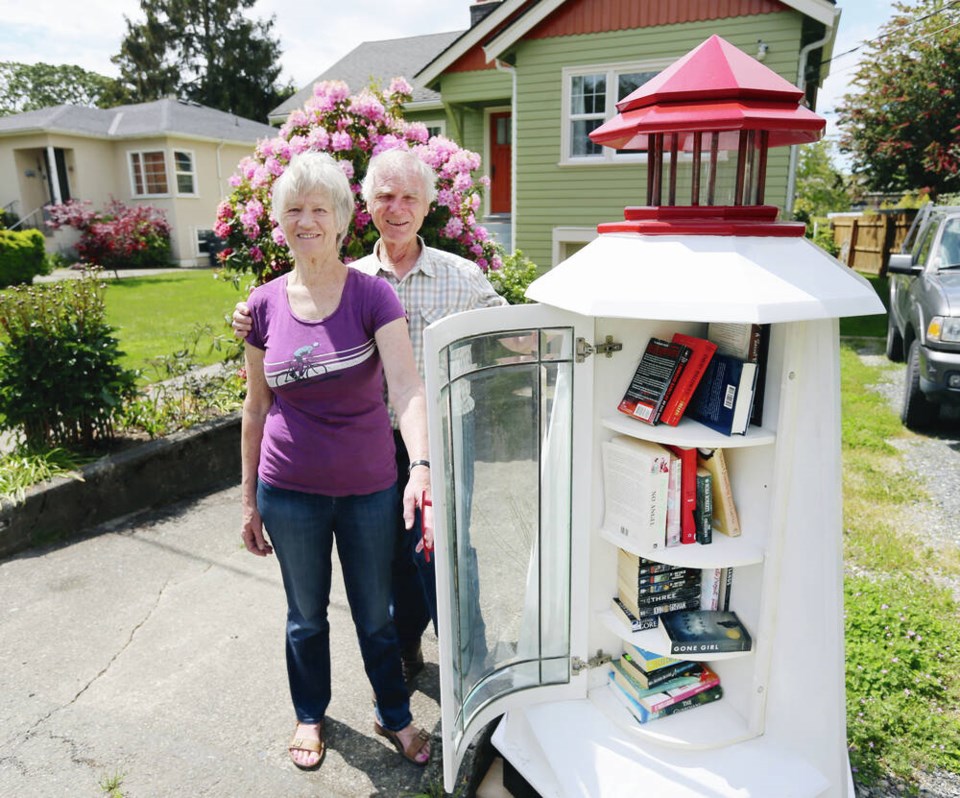It’s not official, but it seems Victoria’s first little free library was the one Angela Evans started on Clare Street in 2008.
Fashioned from a recycled window and plywood scavenged from a neighbour’s deck, and with a peaked roof decorated with tiles peeled from a discarded disco ball, the book box outside her home provided a nice little bonding point for a street that already enjoyed a high degree of sociability.
That pleased Evans, a community planner who mentioned Portland, Oregon’s City Repair Project as the inspiration for her book exchange.
“I’m really passionate about retrofitting our existing communities so we can live more sustainably,” she said at the time. On Clare Street, just off Oak Bay Avenue near Richmond, that meant tire swings and basketball hoops to bring the kids together, block barbecues that sprawled across three backyards, an email group in case anyone needed toilet paper or a ride, a front yard patio where neighbours would gather for what they called Café Clare.
Fast-forward to today. The little free libraries that residents have erected outside their capital region homes have multiplied like zucchini, the difference being that people actually like the take-one, leave-one libraries.
Just ask Teale Phelps Bondaroff, who tows a book-laden trailer behind his bike, stocking the structures for the Victoria Placemaking Network’s Pocket Places Project, which has tasked itself with supporting peoples’ library efforts. As of April, he and other volunteers had delivered 67,861 books to more than 600 homegrown libraries.
Their spread has accelerated during the pandemic. “It just exploded,” Phelps Bondaroff said. His group recorded the region’s 150th little free library in December 2017. The 300th appeared in May 2020, and the 600th this March. (They’re mapped at victoriaplacemaking.ca; just click on Little Free Libraries.)
The newest recorded book library, the 607th, recently popped up on Winston Crescent in Saanich outside the home of retired high school teacher Mary Gidney and her husband, former Times Colonist reporter Norman Gidney. “It looks absolutely stunning,” Phelps Bondaroff said.
He’s right. The Gidneys’ effort was made to look like a lighthouse, complete with a working light powered by a solar panel. It was created by Hike Preuss, the builder who renovated the Gidneys’ home, after Mary urged him to repurpose a curved cabinet door. She figured a library would inspire her book-loving husband (who at the TC was legendary for a desk so overburdened that it would make a structural engineer swallow his gum) to let go of some of the titles piled throughout their house.
As it turns out, others have been adding to the new library, too. “People come by, leave books, take books,” Norman said. Someone donated a three-volume Fifty Shades of Grey set that didn’t stay on the shelf long enough to get comfortable.
Phelps Bondaroff is no longer surprised by what people read. Seven minutes after he left a copy of How To Knit and Felt With Your Cat’s Fur in one library, the book was gone.
The libraries don’t just collect books, either. Phelps Bondaroff knows of 14 that are dedicated to seeds, or include a seed drawer. Eight are repositories of jigsaw puzzles and games. A Fernwood one does art supplies.
They come in a variety of shapes and sizes. Disused newspaper boxes make excellent libraries, particularly for residents who have the desire to host them but don’t have the construction skills. On the flip side, some have the skills but not the location; there’s a woodworker who builds one a month for placement around the Peninsula. A Grade 8 class made 10. Phelps Bondaroff’s group provided 90.
Why does all this matter? Because in a world in which a steady barrage of negative news warps our perspective, little free libraries are a reminder of a basic goodness that is more common than we often realize. They’re an indicator of grassroots decency, just like the chairs that people install at rural bus stops, or the water dishes left for dogs outside local shops.
Angela Evans, the creator of that first box on Clare Street, died of cancer in 2012 at the age of 51. That little library remains, though, and remains well-used. Evans’ husband, Mark Hornell, and his partner, Karen Platt, took it down while rebuilding the house in 2017, but then revarnished the book box, replaced its glass, mounted the structure atop a new stone wall, and built a bench on which passersby now perch and read. A plaque bearing Evans’ name may follow.
• To comment on this article, write a letter to the editor: [email protected]



